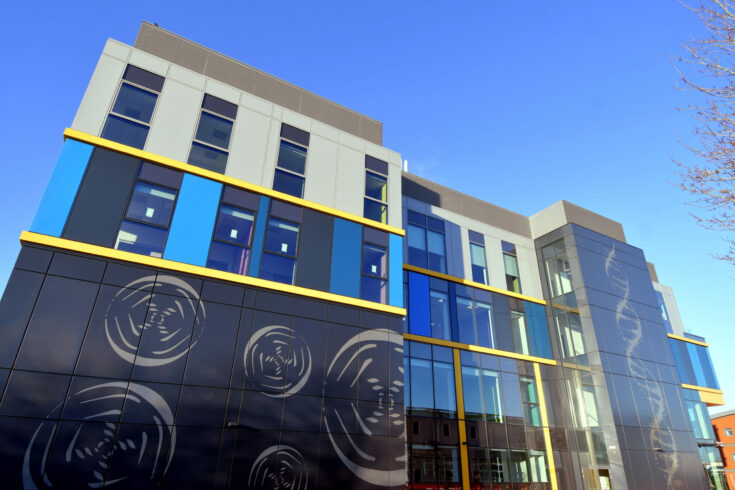The £40 million hub building that will house The Rosalind Franklin Institute on the Harwell Science and Innovation campus has reached practical completion.
With the construction company handing legal ownership to UK Research and Innovation (UKRI), the Franklin will now commence specialist scientific fit out.
The Franklin, funded through UKRI’s Engineering and Physical Sciences Research Council (EPSRC), is dedicated to creating technologies that will change the way researchers see life.
These technologies will be housed in the hub at Harwell alongside 200 researchers, including collaborators from academia and industry.
Novel understanding
EPSRC Executive Chair, Professor Dame Lynn Gladden said:
The Franklin Hub will provide an important focus within the research landscape, helping the UK to maintain a leading position in the application of novel understanding in engineering and physical sciences to transform life sciences through interdisciplinary research and technology development.
Professor James Naismith, Director of The Franklin said:
This is a building created by scientists for cutting edge research, and we are looking forward to continuing to deliver impact for the UK.
The hub shows that it is possible to deliver a highly functional science building that is on budget, on time, energy efficient, a record breaker in space utilisation, and visually inspiring.
Our scientists coming together in the building for the first time will deliver scientific firsts impacting across the UK nations. By doing so we will honour the legacy of our namesake Rosalind Franklin and try to be worthy of bearing her name.
Supporting sensitive research equipment
This new lab environment will be capable of supporting some of the world’s most sensitive research equipment.
The hub’s suites for electron microscopy are some of the most electromagnetically stable spaces on the planet, with stainless steel shielding and piled foundations creating ideal research conditions.
More than 50 fume hoods enable next generation chemistry, requiring miles of ducting. Despite mixing such different technologies, there is not a square metre of wasted space; the hub is one of the most space efficient research buildings in the UK.
Promoting collaboration
Specialist labs for imaging, mass spectrometry, structural biology and chemistry have been designed to promote collaboration, while prioritising efficiency in space utilisation.
Research already underway at The Franklin on the Harwell Campus and in spokes around the UK has led to the development of:
- nanobodies against SARS-CoV-2
- breakthroughs in imaging biological samples using electrons
- chemistry techniques that can enable proteins to be modified within cells.
Commenting on this latest Institute milestone, STFC Executive Chair Professor Mark Thomson said:
In recent years STFC’s health technology cluster here at Harwell has gone from strength to strength and the Rosalind Franklin Institute will become an essential element in that growing health technology ecosystem. Today’s announcement brings us a big step closer to the Franklin becoming operational and we look forward to supporting them in finding answers to the great life science challenges of the day.
The Hub has been delivered on time and on budget by Mace in partnership with UKRI-STFC, the Franklin and AECOM.
Further information
The Rosalind Franklin Institute
The Rosalind Franklin Institute is a national institute dedicated to transforming life science through interdisciplinary research and technology development.
The institute will bring together researchers in life, physical science, and engineering, to develop disruptive new technologies designed to tackle major challenges in health and life sciences.
Focussing initially on five major research themes, the institute will have significant impact in imaging, diagnostics, drug development, and many more fields.
The Franklin is funded through UKRI through EPSRC. It is an independent organisation founded by:
- UKRI
- ten UK universities
- Diamond Light Source.
It will have its central hub at the Harwell Science and Innovation Campus.

